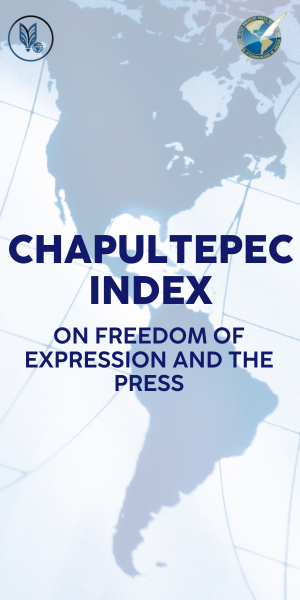Quito, Ecuador (March 20, 2024) - Ecuadorian President Daniel Noboa committed on Tuesday to guaranteeing press freedom and freedom of expression in his country by signing the Chapultepec and Salta declarations after a meeting with an international delegation from the Inter American Press Association (IAPA). The meeting took place at the Carondelet Presidential Palace in the city of Quito.
"If the press is not respected, people are not respected," stated President Noboa during his meeting with IAPA. The Ecuadorian leader indicated that since taking office, he
accepts criticism," although he clarified that he does not agree with all of it. He was emphatic in distinguishing himself from populist leaders in the region, stating that he seeks to express "the opposite of authoritarianism."
A delegation from IAPA is currently in Ecuador this week to address the situation facing journalists and media this country. The delegation, led by President Roberto Rock from the digital platform La Silla Rota in Mexico, includes former IAPA President Michael Greenspon from The New York Times, United States; former IAPA President Jaime Mantilla, and the organization's Executive Director, Carlos Lauría. Also joining the delegation are IAPA Executive Committee Chair Gabriela Vivanco from La Hora in Quito, and Carlos Pérez, the regional vice president for Ecuador, from El Universo in Guayaquil.
The IAPA President shared various concerns with the Ecuadorian head of state regarding the state of press freedom in Ecuador. Rock emphasized that in the face of violence threatening the press, it is essential to provide the necessary resources to the journalist protection mechanism so that it can fulfill its mission, as the current budget is only enough to pay its employees' salaries. He added that it is imperative to urgently address impunity in cases of attacks against journalists to prevent cases from multiplying and being forgotten. He insisted on the need to adapt internal legislation in the case of libel and slander offenses to Interamerican standards so that only civil sanctions can be applied. Lastly, he highlighted the need to strengthen the law on access to public information so that it serves not only journalists but also the public.
"We are excited about the message we received in the conversation with President Noboa because he made it clear that he seeks to live up to a statesman who does not think about the next election but about the next generation," Rock said in a public event following the presidential meeting with representatives of local media outlets. "We have talked about the importance of press freedom as one of the pillars of democracy," added Roberto Izurieta, the presidency's communication secretary.
Rock added that Ecuador, like other countries in the region, "has suffered a lot" from authoritarian government models, "that have fought against the media and, with it, have fought against citizens' rights to be informed." The IAPA president added that "they have sought to delegitimize, they have sought to discredit, even dehumanize journalistic work; governments that thought they would be forever, that they would defeat and even make independent journalism disappear."
Due to the overall insecurity situation in Ecuador resulting from the rise of organized crime, violence against journalists has increased, leading entire communities in the interior of the country to become "silent zones." In January, armed criminals stormed the premises of TC Televisión in Guayaquil and fired shots into the air while the channel was broadcasting live, according to the IAPA. In the past year, several journalists had to leave the country and relocate within Ecuador due to serious threats.
President Noboa signed the Chapultepec and Salta declarations, hemispheric IAPA documents of reference on freedom of expression and press freedom. The Chapultepec Declaration, adopted in 1994, summarizes in 10 principles the concept of consolidating public freedoms and human rights with the understanding that the "engine and starting point of basic human rights" is freedom of expression. The Salta Declaration on Principles of Freedom of Expression in the Digital Age, adopted in 2018, consists of 13 principles created to protect the free flow of information regardless of the platform through which it spreads, and promote greater efficiency to defend and promote freedom of expression in the face of advances in new information and communication technologies.
IAPA is a non-profit organization dedicated to defending and promoting freedom of the press and expression in the Americas. It comprises more than 1,300 publications from the western hemisphere; and is based in Miami, Florida, United States.








